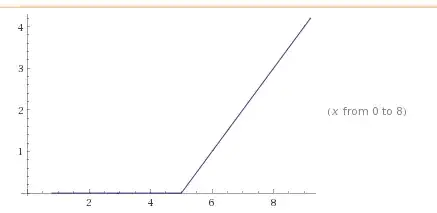The function is equal to $f(x) = \dfrac{|x-5|+(x-5)}{2}.$
That could be considered "piecewise" because the absolute value function is defined piecewise, but its piecewise nature is not made explicit in this characterization.
If your function were defined only on a bounded interval I might think about a partial sum of a Fourier series.
PS: Alright, lets work with generalized functions and define derivatives accordingly Then $f'(x) = \left.\begin{cases} 1, & x>5, \\ 0, & x<5, \end{cases}\right\}$, and so $f''(x)=\delta(x-5)$.
Then the Fourier transform of $f''(x)$ is
$$
(\mathcal F (f''))(t) = \int_{-\infty}^\infty e^{-itx} \delta(x-5)\,dx = e^{-5it}.
$$
Recall that
$$
(\mathcal F (f'))(t) = -it(\mathcal F f)(t),
$$
so
$$
(\mathcal F (f''))(t) = -t^2(\mathcal F f)(t).
$$
So
$$
(\mathcal F f)(t) = \frac{-e^{5it}}{t^2}.
$$
Applying an inverse Fourier transform should return the original function. So you want an "approximation". Maybe I'd try doing the inverse Fourier transform but find only $\int_{-A}^{-\varepsilon}+\int_\varepsilon^A$ instead of $\int_{-\infty}^\infty$.
